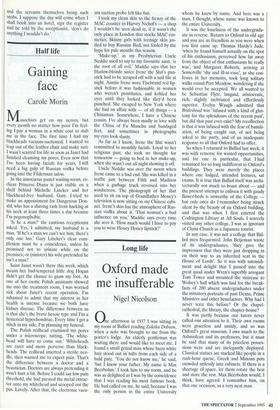Long life
Oxford made me insufferable
Nigel Nicolson
One afternoon in 1937 I was sitting in my room at Balliol reading Zuleika Dobson, when a note was brought to me from the porter's lodge. An elderly gentleman was waiting there and would like to meet me. I found a small genial man whose fuzzy white hair stood out in tufts from each side of a bald pate. 'You do not know me,' he said, 'but I know your father. My name is Max Beerbohm.' I took him to my room, and he was as delighted as I was by the coincidence that I was reading his most famous book. He had called on me, he said, because I was the only person in the entire University whom he knew by name. And here was a man, I thought, whose name was known to the entire University.
It was the loneliness of the undergradu- ate in reverse. Return to Oxford in old age and you are as friendless as you were when you first came up. Thomas Hardy's Jude, 'when he found himself actually on the spot of his enthusiasm, perceived how far away from the object of that enthusiasm he really was', and Margaret Roberts, arriving at Somerville 'shy and ill-at-ease', as she con- fesses in her memoirs, took long solitary walks round Port Meadow, wondering if she would ever be accepted. We all wanted to be Sebastian Flyte, languid, aristocratic, rich, slightly inebriated and effortlessly superior. Evelyn Waugh admitted that Brideshead was 'infused with a kind of glut- tony for the splendours of the recent past', but did that past ever exist? My recollection is that it was infused with the fear of humili- ation, of being caught out, of not being asked to the party, and of an inadequate response to all that Oxford had to offer.
So when I returned to Balliol last week, it was with remorse for wasted opportunities, and for one in particular, that I had remained for so long indifferent to Oxford's buildings. They were merely the places where one lodged, attended lectures, sat exams. It is true that Balliol itself was archi- tecturally not much to boast about — and the present attempt to enliven it with gaudy flower-beds is unworthy of the College — but only once do I remember being struck silent by the beauty of an Oxford building, and that was when I first entered the Codrington Library at All Souls. I scarcely visited any other college. I was as ignorant of Christ Church as a Japanese tourist.
In any case, it was not a college that Bal- liol men frequented. John Betjeman wrote of its undergraduates, 'they gave the impression that they were just dropping in on their way to an inherited seat in the House of Lords'. So it was with astonish- ment and delight that I passed into the great quad under Wren's superbly arrogant Tom Tower and mounted the staircase to Wolsey's hall which was laid for the break- fasts of 200 absent undergraduates under the minatory portraits of past Deans, Prime Ministers and other benefactors. Why had I never seen this before? Or the chapel- cathedral, the library, the chapter-house?
It was partly because our tutors never called our attention to it. Their own rooms were graceless and untidy, and so was Oxford's great museum. I owe much to the Ashmolean and its professors, but it must be said that many of its priceless posses- sions were and are inelegantly displayed. Classical statues are stacked like people in a rush-hour queue, Greek and Minoan pots crowded artlessly into cabinets. If there is a shortage of space, let them rotate the best and store the rest. Max Beerbohm would, I think, have agreed. I remember him, on that one occasion, as a very neat man.


















































 Previous page
Previous page